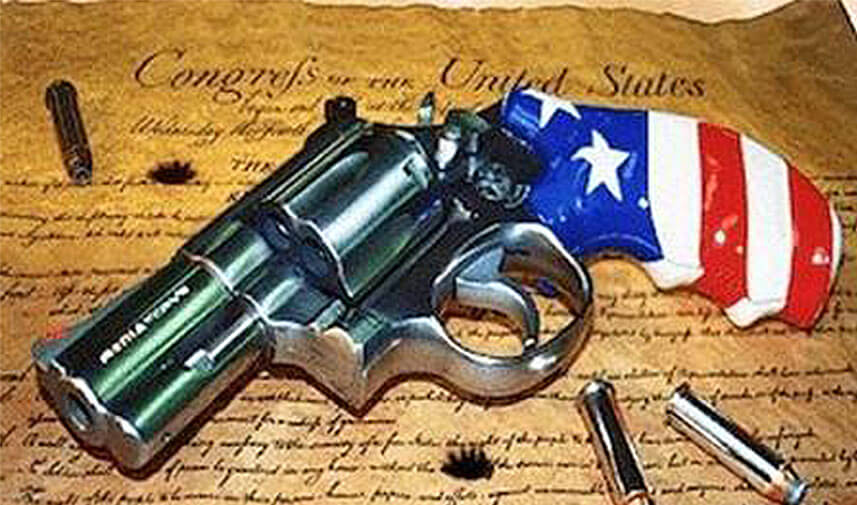


Freedom Lost, Freedom Gained: Gun Laws in America
By Akanksha Gopinath, Official Jaipur Literature Festival Blogger
The rising wave of gun violence can seem hopeless when you look at in the staggering number of firearm Ârelated killings over recent years. According to the Gun Violence Archive, some thirteen thousand people were killed and many more injured in the US by firearms in 2015 alone.
The recent Minneapolis Police shootings and the consequential Dallas shootings have again raised concerns over the easy access and availability of firearms to civilians. The ethical implications of police shootings, such as in Minneapolis, cannot be compared with criminal and civilian shootings, since the need for the responsible administration of authority is a separate topic of debate.
In terms of civilian and criminal shootings in America, contrary to popular belief, easy access to firearms does not account for the number of firearm-related killings. Switzerland’s homicide rate is among the lowest in the world, yet it champions the use of personal firearms, boasting the third highest firearm ownership per capita rate in the world. This suggests that although there might be a correlation between arms procurement and homicide rates, it is not the only variable at play.
In the US, a large percentage of gunÂrelated crimes are committed by criminals and not by civilians. The Center for Disease Control (CDC) report that gang homicides amounted to more or less 8,900 of 11,100 gun murders in both 2010 and 2011. Arguably, pressing for the education and rehabilitation of criminal groups would be a more pragmatic course of action than placing restrictions on their weapon of choice: a few more gun control laws would not necessarily hinder procurement by those already living outside of the law.
Advocates for and against gun control have legitimate reasons behind their stances, so it seems imperative to find a middle ground between them, balancing the right to protect oneself against the dangers of open access to firearms, with the right to protect oneself with a firearm.
AntiÂban protagonists claim that the only palpable effect of more stringent gun control laws would be an overly bureaucratic arms procurement system that would ultimately only affect lawÂabiding Americans, violating their Constitutional Right to keep and bear arms under the Second Amendment.
Advocates for a ban argue that the rise of shootings involving civilians calls for a more judicious handling of arms distribution and possession. The cries of the families of the victims of mass shootings at the Connecticut Elementary School, Virginia Tech, San Bernandino, Bakersfield and many more cannot go unheeded.
The extensive media coverage of gang and mass shootings seems to be perpetuating a never-ending cycle of fear, which feeds the idea that increased arms possession is needed for personal protection. Yet it is debatable how sensible it is to let people take law enforcement and security into their own hands, and it also provides people with a false sense of security: gun possession is in fact known to increase the risk of accidents, suicides and domestic violence.
The Gun Regulation debate has been propelled to the forefront of the recent US Presidential campaign. Hillary Clinton has promised stronger gun control laws at the expense of the right to self-defense, and Republicans maintain the opposing stance, in line with the National Rifle Association, an organization known to lobby for Arms Industry interests. Without getting sucked into the detailed political hocus pocus, the pertinent question remains: how to respect Constitutional rights and honour the dignity of human life at the same time.
The seemingly paradoxical nature of the question is perhaps misleading, since the potential solution could be to tackle the indiscriminate sale of guns, rather than make them totally inaccessible to civilians. Criminal use of guns could be much better contained without needing to infringe on the rights of law-abiding Americans. Thorough background checks, licensing gun dealers and screening for mental illnesses could actively limit firearms falling into wrong hands. Only 18 out of 50 US states have such universal background checks in place. Furthermore a total ban of assault weapons seems valid, since it has hard to justify civilian access to military style weapons.
Replacing the agglomeration of state laws with unambiguous, centralized reforms could pave the way to greater clarity and more efficient enforcement. A meticulous and unified approach to arms procurement might seem like freedom lost to some, but a safer America surely entails more freedom, liberty and peace for everyone. Freedom lost, freedom gained.
(c) 2016 Akanksha Gopinath
Like this blog? Find more interesting blogs about the Jaipur Literature Festival in Jaipur too! Click here.
Disclaimer: We do not endorse, support or subscribe for any statement, view or comment expressed or posted on this blog or social media page. Any view, statement or comment posted on this platform does not represent the views of Teamwork Arts, its affiliates or its employees or any person associate with Jaipur Literature Festival (JLF), unless specifically stated otherwise.



Leave a comment